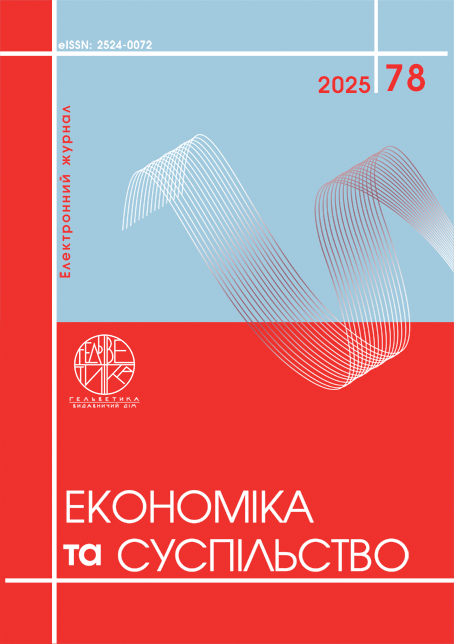ВИКОРИСТАННЯ ШТУЧНОГО ІНТЕЛЕКТУ У РЕКЛАМНІЙ ДІЯЛЬНОСТІ ПІДПРИЄМСТВ ХАРЧОВОЇ ПРОМИСЛОВОСТІ
Анотація
В статті обґрунтовано необхідність впровадження технологій штучного інтелекту в рекламну діяльність підприємств харчової промисловості. Наголошено, що успішне впровадження штучного інтелекту вимагає стратегічного підходу, синергії ІТ-технологій із маркетингом та високої гнучкості бізнес-моделі. Зазначено, що прогнозування продажів за допомогою штучного інтелекту здійснюється поетапно: збір даних; виявлення закономірностей; формування рекомендацій. З-поміж основних можливостей ШІ-реклами виокремлено такі: автоматичний вибір аудиторії для показу реклами; оптимізація бюджету рекламної кампанії; аналіз ефективності в реальному часі та коригування стратегії тощо. Узагальнено основні переваги та недоліки застосування штучного інтелекту в рекламній діяльності підприємств харчової промисловості. Надано рекомендації для подолання проблем використання штучного інтелекту у рекламній діяльності підприємств харчової промисловості.
Посилання
AI for CPG Companies: Transforming Innovation and Growth in 2025. Softservebs : вебсайт. URL: https://softservebs.com/en/resources/ai-and-cpg/ (дата звернення: 23.03.2025).
AI in the Food Industry: Benefits, Challenges and Uses. Enatega: вебсайт 2025. URL: https://enatega.com/ai-in-the-food-industry/ (дата звернення: 23.03.2025).
An G. K., Ngo T. T. A. AI-powered personalized advertising and purchase intention in Vietnam’s digital landscape: The role of trust, relevance, and usefulness. Journal of Open Innovation: Technology, Market, and Complexity, 2025, 11.3: 100580. DOI: https://doi.org/10.1016/j.joitmc.2025.100580
Kietzmann J., Paschen J., Treen E. Artificial Intelligence in Advertising: How Marketers Can Leverage Artificial Intelligence Along the Consumer Journey. Journal of Advertising Research. 2018. Vol. 58, No. 3. P. 263–267. DOI: https://doi.org/10.2501/JAR-2018-035
The Impact of AI on Digital Advertising Report. IabEurope: вебсайт. URL: https://iabeurope.eu/knowledge_hub/the-impact-of-ai-on-digital-advertising-report/ (дата звернення: 18.09.2025).
Use of artificial intelligence in marketing. Joint survey by Gradus Research and dentsu Ukraine. Gradus: вебсайт URL: https://gradus.app/en/open-reports/use-artificial-intelligence-marketing/ (дата звернення: 11.06.2025).
Бергер А.Д. Прийняття інноваційних маркетингових рішень на підприємствах харчової промисловості. Наукові праці НУХТ. 2023. №2(54). С. 293-406.
Білик М.Ю., Мороз О.В., Латишев К.О. Використання штучного інтелекту в маркетинговій діяльності підприємств. Ефективна економіка. 2024. № 1. URL: https://www.nayka.com.ua/index.php/ee/article/view/2895/2931 (дата звернення: 23.03.2025).
Клименко А. С., Мороз О. В. Етичні аспекти використання штучного інтелекту у маркетингу. Актуальні питання управління трансформаційними процесами в сучасному суспільстві: проблеми та перспективи: Матеріали XІII Міжнародної науково-практичної інтернет-конференції( 23–24 жовтня 2024 року). 2024. С. 88–90.
Кубашевський О. Є. Використання омніканального маркетингу для просування товарів харчової промисловості. Підприємництво і торгівля. 2024. № 42. С. 39–45.
Кузьомко В., Бурангулова В., Бурангулова В. Можливості використання штучного інтелекту в діяльності сучасних підприємств. Економіка та суспільство. 2021. № 32. DOI: https://doi.org/10.32782/2524-0072/2021-32-67 (дата звернення: 23.03.2025).
Линдюк А., Гаврилюк І., Томашевський Ю., Хирівський Р., Когут М. Вплив штучного інтелекту на маркетингові комунікації: нові бізнес-можливості та виклики. Економіка розвитку. 2024. Т. 23, № 4. С. 60–71.
Пєтухова О. М., Бергер А. Д. Вплив штучного інтелекту на маркетингову діяльність підприємств м’ясної промисловості. Київський економічний науковий журнал. 2023. № 3. С. 129–134.
AI for CPG Companies: Transforming Innovation and Growth in 2025. Available at: https://softservebs.com/en/resources/ai-and-cpg/ (accessed April 29, 2025).
AI in the Food Industry: Benefits, Challenges and Uses. Available at: https://enatega.com/ai-in-the-food-industry/ (accessed April 29, 2025).
An G. K., Ngo T. T. A. (2025). AI-powered personalized advertising and purchase intention in Vietnam’s digital landscape: The role of trust, relevance, and usefulness. Journal of Open Innovation: Technology, Market, and Complexity, 11(3), 100580.
Kietzmann J., Paschen J., Treen E. (2018). Artificial intelligence in advertising: How marketers can leverage artificial intelligence along the consumer journey. Journal of Advertising Research, 58(3), 263-267.
The Impact of AI on Digital Advertising Report. Available at: https://iabeurope.eu/knowledge_hub/the-impact-of-ai-on-digital-advertising-report/ (accessed September 18, 2025).
Use of artificial intelligence in marketing. Joint survey by Gradus Research and dentsu Ukraine. Available at: https://gradus.app/en/open-reports/use-artificial-intelligence-marketing/ (accessed August 20, 2025).
Berger A.D. (2023) Pryiniattia innovatsiinykh marketynhovykh rishen na pidpryiemstvakh kharchovoi promyslovosti [Adoption of innovative marketing solutions at food industry enterprises]. Naukovi pratsi Natsionalnoho universytetu kharchovykh tekhnolohii – Scientific works of the National Technical University of Ukraine, vol. 2(54). pp. 293-406.
Bilyk M.Yu., Moroz O.V., Latyshev K.O. (2024) Vykorystannia shtuchnoho intelektu v marketynhovii diialnosti pidpryiemst [Use of artificial intelligence in the marketing activities of enterprises]. Efektyvna ekonomika - Effective economy, vol. 1. Available at: https://www.nayka.com.ua/index.php/ee/article/view/2895/2931 (accessed April 29, 2025).
Klymenko A. S., Moroz O. V. (2024) Etychni aspekty vykorystannia shtuchnoho intelektu u marketynhu [Ethical aspects of using artificial intelligence in marketing]. Aktualni pytannia upravlinnia transformatsiinymy protsesamy v suchasnomu suspilstvi: problemy ta perspektyvy : XIII Mizhnarodna naukovo-praktychna internet-konferentsiia ( 23–24 zhovtnia 2024 roku), October 23–24, 2024. 2024. P. 88–90. DOI: https://doi.org/10.32782/2079-5009.feu24.2.13 (accessed April 29, 2025).
Kubashevskyi O. E. (2024) Vykorystannia omnikanalnoho marketynhu dlia prosuvannia tovariv kharchovoi promyslovosti [The use of omnichannel marketing to promote food industry products]. Pidpryiemnytstvo i torhivlia – Entrepreneurship and Trade, vol. 42. pp. 39–45.
Kuzyomko V., Burangulova V., Burangulova V. (2021) Mozhlyvosti vykorystannia shtuchnoho intelektu v diialnosti suchasnykh pidpryiemstv [Possibilities of using artificial intelligence in the activities of modern enterprises]. Ekonomika ta suspilstvo – Economy and Society, vol. 32. DOI: https://doi.org/10.32782/2524-0072/2021-32-67 (accessed April 29, 2025).
Lindyuk A., Gavrilyuk I., Tomashevsky Yu., Khyrivsky R., Kohut M. (2024) Vplyv shtuchnoho intelektu na marketynhovi komunikatsii: novi biznes-mozhlyvosti ta vyklyky [The impact of artificial intelligence on marketing communications: new business opportunities and challenges]. Ekonomika rozvytku – Development Economics, vol. 23, No. 4. pp. 60–71.
Petukhova O. M., Berger A. D. (2023) Vplyv shtuchnoho intelektu na marketynhovu diialnist pidpryiemstv miasnoi promyslovosti [The impact of artificial intelligence on the marketing activities of meat industry enterprises]. Kyivskyi ekonomichnyi naukovyi zhurnal – Kyiv Economic Scientific Journal, vol. 3, pp. 129–134.
Авторське право (c) 2025 Наталія Скригун, Валентин Попович, Ірина Бойко

Ця робота ліцензується відповідно до Creative Commons Attribution 4.0 International License.


